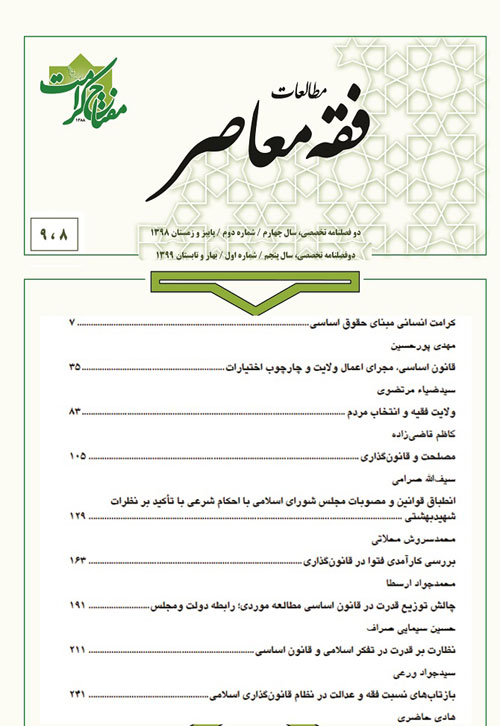Distinguished Muslim Scholars (Fuqaha) and Some Views in Rational Sciences
Author(s):
Abstract:
Development of Islamic jurisprudence (Fiqh) and the relationship between its issues with various theoretical and practical fields of other sciences has caused our Fuqaha deal with other contents and topics as an introduction to the subject matter or just the extraction of denotations of texts. Problems derived from different sciences such as mathematics, astronomy, logic, philosophy, mysticism and etc. have been most widely used in Fiqh. In this regard, the conversance and the amount of mastery each Faqih has about sciences are very effective on how to investigate the issue and reach to a conclusion. This paper is an introduction to the study of some discussions in Islamic jurisprudence and its principles. This is an argument on how Fuqaha address problems and make inferences about them. The author holds that the first necessary condition to enter this debate is adequate personal knowledge and information about that science and secondly, the right proper way is that the joint committees of fields related to a topic organize a coordinated and collective research project, the same way it is practiced today in the production of many common achievements of science.
Keywords:
Language:
Persian
Published:
مجله مطالعات فقه معاصر, Volume:1 Issue: 2, 2017
Page:
53
magiran.com/p1759245
دانلود و مطالعه متن این مقاله با یکی از روشهای زیر امکان پذیر است:
اشتراک شخصی
با عضویت و پرداخت آنلاین حق اشتراک یکساله به مبلغ 1,390,000ريال میتوانید 70 عنوان مطلب دانلود کنید!
اشتراک سازمانی
به کتابخانه دانشگاه یا محل کار خود پیشنهاد کنید تا اشتراک سازمانی این پایگاه را برای دسترسی نامحدود همه کاربران به متن مطالب تهیه نمایند!
توجه!
- حق عضویت دریافتی صرف حمایت از نشریات عضو و نگهداری، تکمیل و توسعه مگیران میشود.
- پرداخت حق اشتراک و دانلود مقالات اجازه بازنشر آن در سایر رسانههای چاپی و دیجیتال را به کاربر نمیدهد.
In order to view content subscription is required
Personal subscription
Subscribe magiran.com for 70 € euros via PayPal and download 70 articles during a year.
Organization subscription
Please contact us to subscribe your university or library for unlimited access!



